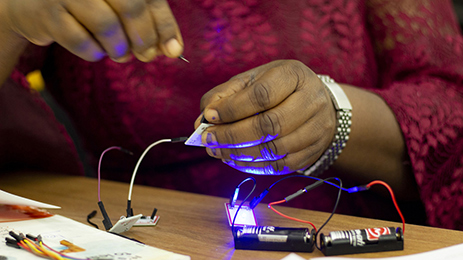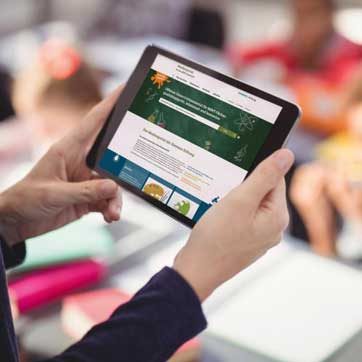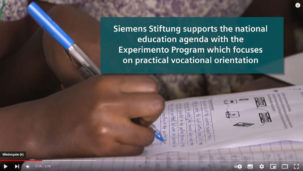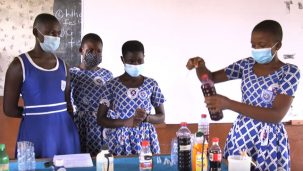Vocational orientation in STEM
Guidance on the way to the working world

Africa has the youngest population in the world. Good education provides enormous potential when it comes to the continent’s political, economic, and social development – and for the personal development of each of the continent’s citizens. Practical knowledge drawn from real-life experience is particularly valuable for permanently shaping societies. But how do young people find the right path to the working world? Who can provide them with guidance as they approach the end of school and the beginning of their careers? To close the gap between theory and practice, we developed materials and training seminars on vocational orientation in STEM lessons.
Project
Shaping the future with STEM careers
Science and technology skills are important for shaping Africa’s long-term future, which includes expanding renewable energy and clean technology, fighting disease, sustainable agriculture, and creating digital societies.
But how do young people get started in STEM professions? As they make decisions about their own careers, young people often turn to parents and family members for recommendations and experience. However, this can limit the range of available options. Vocational orientation begins much earlier than when a young person graduates from school; in fact, it is important to provide vocational perspectives while they are still enrolled. In most African countries, “vocational orientation” is a fixed part of the curriculum and a key pillar of general education. Even so, this material is not always delivered consistently, especially since many teachers do not have practical experience in certain vocational profiles.
Our materials on vocational orientation in STEM provide educators with materials that help them demonstrate STEM career paths of the 21st century.
Teachers in Ghana receive training to implement Vocational Orientation in their classes.
© Siemens Stiftung


Materials
Teaching and learning materials on vocational orientation
All materials are based on our international education program Experimento, which uses the methods of inquiry-based learning to teach competency-based STEM knowledge. Teachers have access to a wealth of ideas for STEM lessons with more than 130 experiments that have been adapted to national curricula and teaching method guidance on the subjects of energy, health, and environment.
Lehrkräfte in Ghana werden weitergebildet, um Vocational Orientation in ihren Klassen zu vermitteln.
„Vocational Orientation” module
Within the Experimento framework, a module on “Vocational Orientation” was developed for the African context. The module includes engaging instructions for autonomous experimentation in renewable energy, electronics, and climate change education. These allow students to gain insights into career profiles that are linked to the acquisition of STEM knowledge. The materials are available to teachers in the Media Portal and serve as tools for providing action-oriented access to STEM, with insights into practicalities and expectations. The “Vocational Orientation” materials are based on the “hands-on – minds-on” concept and are made for seventh to ninth grade teachers.
hands-on, minds-on
With inquiry-based learning, students pursue their own ideas and hypotheses. They try things out on their own and explore problems and questions. Learning and coming to conclusions in this practical manner have a more lasting impact than purely theoretical knowledge.
Web-based trainings on STEM careers
We also promote vocational orientation with student units available on the atingi digital learning platform from the German Federal Ministry for Economic Cooperation and Development (BMZ). Together with the German development agency Deutsche Gesellschaft für Internationale Zusammenarbeit (GIZ), which implements atingi, we have developed web-based trainings (WBT) on STEM occupational profiles. This allows STEM knowledge and vocational orientation to be linked in an innovative way. So far, trainings are available for the career profiles ‘electrician’, ‘agriprenuer’, ‘paramedic’ and ‘software developer’. Each online training contains a range of viewpoints and insights from across the continent.
Contact
Would you like to work with us? Or are there questions?
Vocational Orientation / Experimento
Rebecca Ottmann
rebecca.ottmann@siemens-stiftung.org
+49 174 155 94 83
Would you like to learn more?
Website
Video
Get to know our media portal too!
Media Portal for STEM lessons
More than 3,200 open educational resources in German and English
For teachers and students – for the classroom or independent learning
Materials available online and offline






